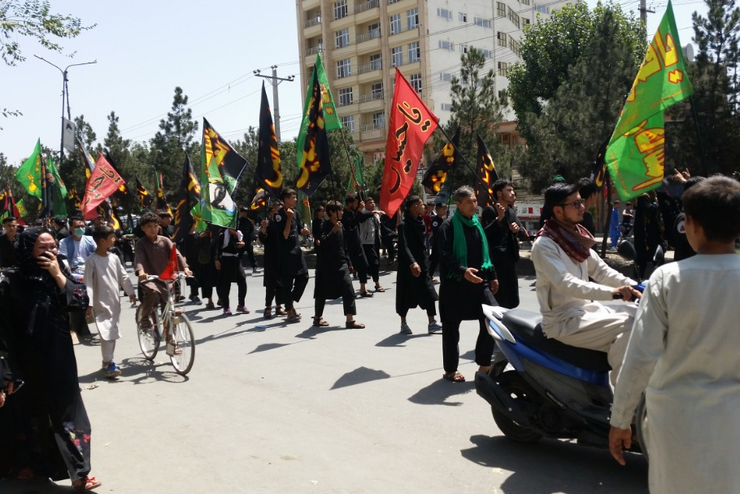AhlulBayt News Agency (ABNA): Some followers of the Shia sect in the country are complaining about the hostile treatment of the Taliban towards Shia individuals and the Taliban’s supreme leader’s decisions regarding Shias. They argue that the appointment of Sunni councils for Shia-majority provinces, restrictions on Muharram mourning ceremonies, the exclusion of Shias from power structures, and the mistreatment of Shia residents in Shia-populated areas have led to a sense of alienation among Shia followers in their country.
Shia religious scholars in the country have also condemned the Taliban’s treatment of Shia followers, warning that such actions further deepen the divide between followers of different faiths in Afghanistan. However, these condemnations and warnings have not been effective in the past nearly three years. Therefore, religious intellectuals describe “religious tolerance” as a necessary right in societies and argue that unless the ruling regime adopts a neutral stance towards religions and sects, religious tolerance and coexistence will not be realized in the country.
Sayed Esmatullah, a Shia resident of Sayedan Alley, Dasht-e Barchi, Kabul, informed the Hasht-e Subh Daily that the ruling regime discriminates against Shia communities at various levels. He asserts that discrimination, from the allocation of humanitarian aid to the exclusion of Shia individuals from important decisions, is prevalent and attributed to the Taliban. Sayed Esmatullah further remarks, “Humanitarian aid is scarcely provided in regions with significant Shia populations. There is no Shia or Hazara representation in the army, police force, or government ministries. This does not constitute effective governance. Our people feel alienated in their land, despite our deep roots and national identity in Afghanistan.”
Mohammad Kazem, a Shia resident of the “Chandawol” area in the first district of Kabul city, asserts that religious freedom is a fundamental right for all citizens. He believes that political leaders should refrain from biased interference in religious matters and beliefs. As a retired government official, he laments the lack of proper observance of mourning ceremonies since the rise of religious leaders. Last year, during Muharram, the Taliban forcibly removed mourning flags from cars and shops, insulting people for their beliefs. Kazem emphasizes that the Taliban’s discriminatory treatment of ethnicities and religious groups exacerbates social divisions and may lead to future civil unrest.
Shia followers voice complaints about the ruling regime’s hostile treatment, citing the Taliban’s adherence to the “Deobandi” branch of the Hanafi school of thought. The Taliban leadership insists that this religious belief should be followed by all citizens. Last September, Taliban Supreme Leader Mullah Hibatullah Akhundzada announced the formation of provincial councils of religious scholars tasked with overseeing societal actions and advising the Taliban leadership.
According to the announced list, all members of these councils at the national level consist of Sunni religious scholars, with no Shia religious scholars visible in their composition. Even in provinces where the majority are Shia, no Shia religious scholar has been included in the formation of their councils.
The National Council of Shia Scholars in the country described the composition of these councils as unfair and unjust, urging the Taliban supreme leader to reconsider.
Sayed Hussain Alami Balkhi, the deputy of the Council of Shia Scholars of Afghanistan, explained that such actions by the Taliban supreme leader widen the gap among followers of different faiths. Now that more than ten months have passed since the establishment of these councils, no Shia religious scholar has been added to their formation.
Conversely, there are efforts to exclude Shia Muslims from the current power structure in the country, with the Taliban occasionally imposing restrictions on the religious freedoms of this community. Shia personal status laws are not applied in courts to the followers of this faith, and the teaching of Ja’fari jurisprudence has been removed from university curricula. Furthermore, the Taliban continue to prohibit Shia citizens from holding Muharram religious ceremonies, as they did during the Republic era.
In this context, experts on religious affairs and religious intellectuals describe “religious freedom” as a fundamental solution for individuals in modern society and emphasize religious tolerance in the country.
Mohammad Moheq, a researcher and religious intellectual, told the Hasht-e Subh Daily, “For religious tolerance to be implemented in a society, the fundamental step is for a government to be impartial towards all religions and faiths. When the ruling regime and the executive apparatus lean towards a particular religion, it’s natural that they cannot act impartially, and other religions may feel persecuted in some way.” According to him, the only option to prevent the harassment and oppression of citizens based on religious differences is to design a new structure of political and administrative system based on the neutrality of the government towards different religions and faiths, providing equal rights to all, building people’s belief in the principle of tolerance and compassion through education and awareness, and supporting this principle through appropriate laws.
Although Taliban officials have repeatedly emphasized respect for religious freedoms in press conferences and official statements, their ethical recommendations have not been able to prevent the harassment and oppression of non-Hanafi religious followers in the absence of support from the ruling system.
The U.S. Commission on International Religious Freedom (USCIRF) has also stated in a report that the conditions of religious freedom in Afghanistan under Taliban rule are deteriorating.
The commission urged the U.S. government to designate Afghanistan as a “country of particular concern” due to systematic violations of religious freedom and to address this issue in talks with the Taliban. However, Mohammad Yunus, a spokesperson for the Taliban Ministry of Information and Culture, stated in his recent remarks last week on Thursday, May 2 regarding safeguarding citizens’ rights: “In Afghanistan, the justice provided is unparalleled elsewhere on Earth, and no one is subjected to cruelty.” He continues to urge countries not to interfere in Afghanistan’s internal affairs.
.......................
End/ 257

